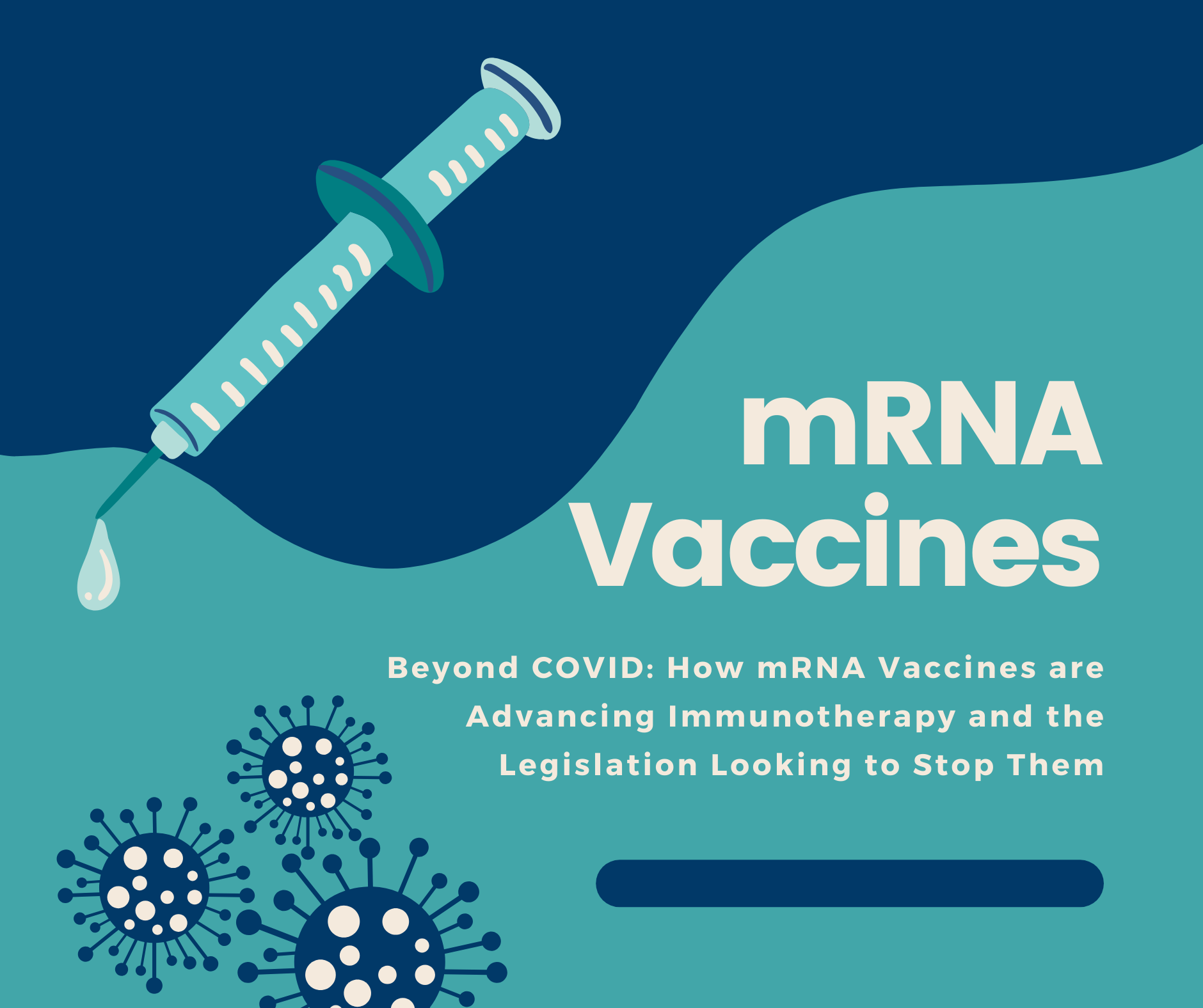How mRNA Vaccines are Advancing Immunotherapy

A handful of US states have proposed legislation to restrict or ban mRNA vaccines. Here’s what you need to know.
Iowa, Idaho and Montana have introduced bills aiming to prohibit the use of mRNA vaccines, including those for COVID-19.
- Montana's House of Representatives voted down its proposed ban, while Idaho's bill remains under consideration.
- Idaho’s bill would outright ban the use of mRNA vaccines for 10 years
- After pushback, state Sen. Doug Campbell, who introduced Iowa’s bill, backtracked and revised the bill to require mRNA vaccine makers waive federal liability protections.
Misconceptions about mRNA Vaccines
- Lawmakers and others argue mRNA vaccines are "experimental" or could alter human DNA. These claims have been thoroughly debunked by scientists.
- mRNA vaccines instruct cells to produce a harmless protein similar to what viruses use to gain entry into your cells. By expressing this “flashing neon sign”, our immune system is triggered to respond. Certain cells can be trained to develop lasting immunity against these neon signs. Meaning they develop a memory to respond to future assaults by the same “flashing neon sign”
- Please read: They do not integrate into human DNA. The mRNA is rapidly broken down in the body. What lasts is how you trained your immune system to respond to the flashing neon sign (ie, actual COVID infection).
- Misinformation surrounding mRNA vaccines has contributed to vaccine hesitancy, and recent legislation reinforcing these misconceptions will further erode public trust in science and medicine
- mRNA technology has undergone rigorous safety testing and is continually monitored for adverse events.
Public Health Consequences
- Banning mRNA vaccines will limit access to one of the most effective tools in fighting infectious diseases.
- If the bans take effect, residents may be unable to receive updated COVID-19 boosters, flu vaccines (which may soon include mRNA-based options), or future mRNA-based vaccines against RSV, HIV, or even personalized cancer therapies (see more below).
- Killing mRNA vaccines will lead to increased hospitalizations, deaths, and long-term complications from preventable diseases
Future Directions to Combat Infectious Diseases
mRNA vaccines could be the answer to long-standing challenges to effectively preventing serious infections.
Future Pandemic Preparedness
- mRNA flu vaccines could slash the months it takes to up date the flu vaccine formulation each year and thus improve effectiveness
- mRNA universal vaccines against influenza and/or coronavirus that could protect against multiple virus strains, reducing the risk of future pandemic
RSV vaccine
- The first-ever mRNA-based RSV vaccine for older adults received FDA approval in 2024
HIV vaccine
- Clinical trials are underway for an mRNA HIV vaccine
Zika vaccine
- No widely available vaccine exists yet, but mRNA technology is being explored as a potential solution
Tuberculosis vaccine
- The BCG vaccine offers limited protection. An mRNA-based TB vaccine could improve efficacy.
How mRNA technology can be leveraged beyond infectious diseases
Cancer immunotherapy: Personalized mRNA vaccines can train the immune system to recognize and attack tumors
- Moderna’s mRNA cancer vaccine (mRNA-4157/V940), in combination with the immunotherapy drug Keytruda, has shown promise in treating melanoma by reducing recurrence risk
- mRNA trials are also underway for pancreatic cancer, kidney cancer, and liver cancer
While mRNA vaccine technology was initially developed for infectious diseases, they are now being explored as a potential treatment for autoimmune diseases. The goal is to retrain the immune system to tolerate ‘self-antigens’ by reducing harmful autoimmune responses without broadly suppressing immunity. Under development includes multiple sclerosis, and Type 1 diabetes
Safety Considerations
While mRNA vaccines have been widely used during the COVID-19 pandemic, their application in autoimmune diseases requires careful evaluation. Studies have shown that mRNA COVID-19 vaccines do not significantly increase the risk of developing autoimmune connective tissue diseases, suggesting a favorable safety profile.
Broader Implications for Science and Policy
- The current legislative bans signal the increasing politicization of medical advancements. This will discourage (or even prevent) further research and innovation in vaccine technology.
- These bans will contribute to the broader anti-science movement, reinforcing distrust in public health institutions and complicating efforts to combat misinformation.
- mRNA bans will also dissuade pharmaceutical companies from investing in new vaccine platforms, slowing down progress on vaccines for emerging infectious diseases.
Conclusion
mRNA technology is paving the way for not just infectious disease but personalized autoimmune and cancer treatments, offering a new approach to training the immune system to recognize and fight invaders.

